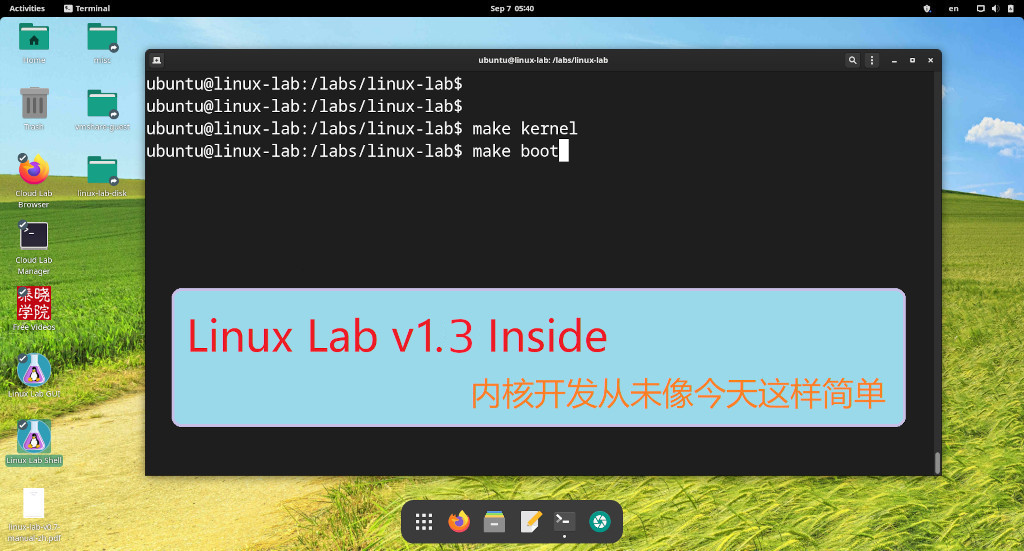[置顶] 泰晓 RISC-V 实验箱,配套 30+ 讲嵌入式 Linux 系统开发公开课
RISC-V jump_label 详解,第 2 部分:指令编码
Author: Wu Zhangjin falcon@tinylab.org Date: 2022/03/28 Project: RISC-V Linux 内核剖析
背景简介
该系列有多篇文章,旨在分析 RISC-V 架构上的 jump_label 实现。
上一篇介绍了其技术原理,jump_label 能够基本消除 Tracepoint 禁用状态的开销,从而确保 Tracepoint 功能可直接编译进内核,并允许线上按需启用 Tracepoints。
从上一节我们已经知道,jump_label 的实现包含三部分:static_branch(foo), 指令编码以及运行时交换 nop 和 goto label(foo) 指令。
本节先来介绍指令编码部分,即带领大家阅读 RISC-V ISA 手册并把 nop 和 goto label(foo) 指令编码出来,继而分析 arch/riscv/kernel/jump_label.c 中的具体实现。
下载指令手册
上周的直播分享上,贾老师简单介绍了 RISC-V ISA 相关的内容,其中提到有两个重要的手册,一个是非特权 ISA,另外一个是特权 ISA。
从 这里 可以找到相应的手册,其中指令编码部分属于 非特权 ISA 手册。
需要注意的是,这个 Spec 文档并不是一成不变的,所以本文提到的页面甚至章节等都可能变动,本文以 riscv-spec-20191213.pdf 为准。
参考手册编码目标指令
指令长度
在第 1 章中明确提到:
The base RISC-V ISA has fixed-length 32-bit instructions that must be naturally aligned on 32-bit boundaries.
但是:
However, the standard RISC-V encoding scheme is designed to support ISA extensions with variable-length instructions, where each instruction can be any number of 16-bit instruction parcels in length and parcels are naturally aligned on 16-bit boundaries. The standard compressed ISA extension described in Chapter 16 reduces code size by providing compressed 16-bit instructions and relaxes the alignment constraints to allow all instructions (16 bit and 32 bit) to be aligned on any 16-bit boundary to improve code densit
本文讨论正常情况,即所有的指令编码长度是 32 位无符号数。
NOP 指令编码
先来看简单一点的 nop 指令,这个在几乎所有架构上都有定义,但是编码却完全跟架构相关。
在非特权手册的 P20/38 页,即下述位置:
- Chapter 2. RV32I Base Integer Instruction Set
- 2.4 Integer Computational Instructions
- Nop Instruction
- 2.4 Integer Computational Instructions
很详细地介绍了:
The NOP instruction does not change any architecturally visible state, except for advancing the pc and incrementing any applicable performance counters. NOP is encoded as ADDI x0, x0, 0.
其编码如下:
31 - 20|19-15|14 - 12|11 - 7|6 - 0 | Bits
-----------|-----|--------|------|---------|------------
imm[11:0] | rs1 | funct3 | rd | opcode | Instruction
-----------|-----|--------|------|---------|------------
12 | 5 | 3 | 5 | 7 | Bits Length
-----------|-----|--------|------|---------|------------
0 | 0 | ADDI | 0 | OP-IMM | Encoding
其中,x0 被编码为 0,而 ADDI 的 OP-IMM 和 funct3 编码可以从 P130/148 页,即下述位置:
- Chapter 24. RV32/64G Instruction Set Listings
直接找到:
31 - 20|19-15|14 - 12|11 - 7|6 - 0 | Bits
-----------|-----|--------|------|---------|------------
imm[11:0] | rs1 | funct3 | rd | opcode | I-Type Instruction
-----------|-----|--------|------|---------|------------
imm[11:0] | rs1 | 000 | rd | 0010011 | ADDI
结合这两部分,确认了 funct3 为 000,而 OP-IMM 为 0010011,进而可以得到如下编码:
31 - 20|19-15|14 - 12|11 - 7|6 - 0 | Bits
-----------|-----|--------|------|---------|------------
imm[11:0] | rs1 | funct3 | rd | opcode | Instruction
-----------|-----|--------|------|---------|------------
12 | 5 | 3 | 5 | 7 | Bits Length
-----------|-----|--------|------|---------|------------
0 | 0 | 000 |00000 | 0010011 | Encoding
所以,NOP 的最终编码是 00010011,即 0x13,考虑指令长度为 32 位,可以定义为:
#define RISCV_INSN_NOP 0x00000013U
JAL/J offset 指令编码
goto label(foo) 是一种无条件跳转需求,并且根据上一篇的分析,其跳转范围在一条 if 语句后面,不会涉及长跳转,所以可以对应 J offset 这样一种直接跳转指令,无需寄存器存放地址后再间接跳转(对应 JALR)。
在最新的 ISA 手册中,硬件 J 指令已经被删除,变成了伪指令,其实现合并进了 JAL 指令,对应 rd=x0,所以实际上我们需要查找的是 JAL offset 指令的编码。
Preface to Version 2.0:
The JAL instruction has now moved to the U-Type format with an explicit destination register, and the J instruction has been dropped being replaced by JAL with rd=x0. This removes the only instruction with an implicit destination register and removes the J-Type instruction format from the base ISA. There is an accompanying reduction in JAL reach, but a significant reduction in base ISA complexity
找到手册的 P21/39 页,即如下位置:
- Chapter 2. RV32I Base Integer Instruction Set
- 2.5 Control Transfer Instructions
- Unconditional Jumps
- 2.5 Control Transfer Instructions
其说明如下:
Plain unconditional jumps (assembler pseudoinstruction J) are encoded as a JAL with rd=x0.
31|30 - 21| 20 |19 - 12|11 - 7|6 - 0 | Bits
--------|---------|--------|----------|------|---------|------------
imm[20] |imm[10:1]|imm[11] |imm[19:12]| rd | opcode | Instruction
--------|---------|--------|----------|------|---------|------------
1 | 10 | 1 | 8 | 5 | 7 | Bits Length
--------------------------------------|------|---------|-----------
offset[20:1] | dest | JAL | Encoding
其中这里的直接跳转也是用到 x0 寄存器,dest 可以直接同 NOP 指令,直接编码为 0,而 JAL 的 OP-IMM 同样可以从 P130/148 页,即下述位置:
- Chapter 24. RV32/64G Instruction Set Listings
直接找到:
31 - 12|11 - 7|6 - 0| Bits
----------------------|------|--------|--------------------
imm[20|10:1|11|19:12] | rd | opcode | J-type Instruction
----------------------|------|--------|---------------------
imm[20|10:1|11|19:12] | rd | 1101111| JAL Encoding
接下来先把 rd 替换为 x0 寄存器并编码为 0, 则 J offset 指令可以编码如下:
31 - 12|11 - 7|6 - 0| Bits
----------------------|------|--------|--------------------
imm[20|10:1|11|19:12] | rd | opcode | J-type Instruction
----------------------|------|--------|---------------------
imm[20|10:1|11|19:12] | 0 | 1101111| J offset Encoding
这里先把 J offset 的 rd 和 opcode 编码定义出来:
#define RISCV_INSN_JAL 0x0000006fU
后面复杂的其实是 offset 的编码,这个并不是简单的把 offset 直接编码进目标指令,而是需要经过复杂的移位。
31|30 - 21| 20 |19 - 12|11 - 7|6 - 0 | Bits
--------|---------|--------|----------|------|---------|------------
imm[20] |imm[10:1]|imm[11] |imm[19:12]| rd | opcode | Instruction
--------|---------|--------|----------|------|---------|------------
1 | 10 | 1 | 8 | 5 | 7 | Bits Length
--------------------------------------|------|---------|-----------
offset[20:1] | 0 | 1101111 | J offset Encoding
比如说 offset 的第 0 位直接是舍弃的(考虑到代码指令长度和对齐要求,所以这一位其实会一直是零),剩下的是复杂的移位:
offset[20]放到目标指令的第 31 位offset[10:1]放到目标指令的第 21-30 位offset[11]放到目标指令的第 20 位offset[12-19]放到目标指令的第 12-19 位
需要先取出目标位再做相对移位,比如第 11 位要移到目标指令的第 20 位,相对移位 (20-11)。
好在 Linux 内核对于取出目标位提供了专门的宏,咱们先搬运一个试试:
((u32)offset & GENMASK(11, 11)) << (20 - 11)
其对应 “取目标位” 和 “相对移位” 两个操作,完整的 J offset 指令编码则如下:
insn = RISCV_INSN_JAL |
(((u32)offset & GENMASK(19, 12)) << (12 - 12)) |
(((u32)offset & GENMASK(11, 11)) << (20 - 11)) |
(((u32)offset & GENMASK(10, 1)) << (21 - 1)) |
(((u32)offset & GENMASK(20, 20)) << (31 - 20));
寄存器编码
上面介绍到的 NOP 和 JAL/J offset 指令均只用到 x0 寄存器,其编码为 0。
由于其他指令可能会用到寄存器编码,这里做个补充介绍。
相关寄存器(x0-x31)的编码为对应的编号 0-31,验证如下。
先准备一段简单的汇编,保存为 test.s:
# test.s
.text
.globl _start
_start:
li x0, 0
li x1, 0
li x2, 0
li x3, 0
li x4, 0
li x5, 0
li x6, 0
li x7, 0
li x8, 0
li a0, 0 # return 0
li a7, 93 # __NR_exit
scall
编译并反编译如下:
$ riscv64-linux-gnu-gcc -march=rv64im -mabi=lp64 -nostdlib -static -o test test.s
$ riscv64-linux-gnu-objdump -d -M no-aliases,numeric ./test
Disassembly of section .text:
0000000000010078 <_start>:
10078: 00000013 addi x0,x0,0
1007c: 00000093 addi x1,x0,0
10080: 00000113 addi x2,x0,0
10084: 00000193 addi x3,x0,0
10088: 00000213 addi x4,x0,0
1008c: 00000293 addi x5,x0,0
10090: 00000313 addi x6,x0,0
10094: 00000393 addi x7,x0,0
10098: 00000413 addi x8,x0,0
1009c: 00000513 addi x10,x0,0
100a0: 05d00893 addi x17,x0,93
100a4: 00000073 ecall
可以看到 li 被实际编码为 addi 指令。ADDI 指令的编码方式已经在 NOP 指令编码 一节找到:
31 - 20|19-15|14 - 12|11 - 7|6 - 0 | Bits
-----------|-----|--------|------|---------|------------
imm[11:0] | rs1 | funct3 | rd | opcode | I-Type Instruction
-----------|-----|--------|------|---------|------------
imm[11:0] | rs1 | 000 | rd | 0010011 | ADDI
把 x0-x8 的寄存器序号 0-8 的二进制编码代入可以依次得到如下编码:
31 - 20|19-15|14 - 12|11 - 7|6 - 0 | Bits
-----------|-----|--------|------|---------|------------
imm[11:0] | rs1 | funct3 | rd | opcode | I-Type Instruction
-----------|-----|--------|------|---------|------------
0 | 0 | 000 |00000 | 0010011 | addi x0,x0,0
0 | 0 | 000 |00001 | 0010011 | addi x1,x0,0
0 | 0 | 000 |00010 | 0010011 | addi x2,x0,0
0 | 0 | 000 |00011 | 0010011 | addi x3,x0,0
0 | 0 | 000 |00100 | 0010011 | addi x4,x0,0
0 | 0 | 000 |00101 | 0010011 | addi x5,x0,0
0 | 0 | 000 |00110 | 0010011 | addi x6,x0,0
0 | 0 | 000 |00111 | 0010011 | addi x7,x0,0
0 | 0 | 000 |01000 | 0010011 | addi x8,x0,0
rd 和 opcode 合并后,正好对应上面的反编译结果,请注意 opcode 只有 7 位,需要从 rd 编码取 1 位凑成后面 2 个十六进制编码,而两者一共 12 位,刚好构成 3 个十六进制数字。
31 - 20|19-15|14 - 12|11 - 7|6 - 0 | Bits
-----------|-----|--------|------|---------|------------
imm[11:0] | rs1 | funct3 | rd | opcode | I-Type Instruction
-------------------------------------------|------------
0x13: 0000 0001 0011 | addi x0,x0,0
0x93: 0000 1001 0011 | addi x1,x0,0
0x113: 0001 0001 0011 | addi x2,x0,0
0x193: 0001 1001 0011 | addi x3,x0,0
0x213: 0010 0001 0011 | addi x4,x0,0
0x293: 0010 1001 0011 | addi x5,x0,0
0x313: 0011 0001 0011 | addi x6,x0,0
0x393: 0011 1001 0011 | addi x7,x0,0
0x413: 0100 0001 0011 | addi x8,x0,0
这样调整一下,就很容易映射过去了。感兴趣的同学,也可以进一步阅读 riscv-gcc 的源代码:gcc/config/riscv。
查看代码实现
接下来再去看代码就比较容易理解了,核心实现见 arch/riscv/kernel/jump_label.c:
#define RISCV_INSN_NOP 0x00000013U
#define RISCV_INSN_JAL 0x0000006fU
void arch_jump_label_transform(struct jump_entry *entry,
enum jump_label_type type)
{
void *addr = (void *)jump_entry_code(entry);
u32 insn;
if (type == JUMP_LABEL_JMP) {
long offset = jump_entry_target(entry) - jump_entry_code(entry);
if (WARN_ON(offset & 1 || offset < -524288 || offset >= 524288))
return;
insn = RISCV_INSN_JAL | /* J offset 指令编码 */
(((u32)offset & GENMASK(19, 12)) << (12 - 12)) |
(((u32)offset & GENMASK(11, 11)) << (20 - 11)) |
(((u32)offset & GENMASK(10, 1)) << (21 - 1)) |
(((u32)offset & GENMASK(20, 20)) << (31 - 20));
} else {
insn = RISCV_INSN_NOP; /* NOP 指令编码 */
}
mutex_lock(&text_mutex);
patch_text_nosync(addr, &insn, sizeof(insn));
mutex_unlock(&text_mutex);
}
本文只涉及 insn 编码部分,余下的部分包括如何获取和计算 offset,如何交换 nop 和 J offset(即 goto label(foo)),其中 offset 的获取和计算同 static_branch(foo) 的实现和 jump table 的设计密切相关。
小结
本文介绍了如何根据 RISC-V 的指令集手册来编码目标指令 nop 和 goto label(foo),该方法适合类似的指令编码需求,相关需求预期会出现在编译技术、内核汇编、性能优化等领域。
接下来我们将继续探讨剩下的两部分代码实现:static_branch(foo) 和运行时交换 nop 和 goto label(foo) 指令。
猜你喜欢:
- 我要投稿:发表原创技术文章,收获福利、挚友与行业影响力
- 知识星球:独家 Linux 实战经验与技巧,订阅「Linux知识星球」
- 视频频道:泰晓学院,B 站,发布各类 Linux 视频课
- 开源小店:欢迎光临泰晓科技自营店,购物支持泰晓原创
- 技术交流:Linux 用户技术交流微信群,联系微信号:tinylab
| 支付宝打赏 ¥9.68元 | 微信打赏 ¥9.68元 | |
 |  请作者喝杯咖啡吧 |  |
Read Album:
- Stratovirt 的 RISC-V 虚拟化支持(六):PLIC 和 串口支持
- Stratovirt 的 RISC-V 虚拟化支持(五):BootLoader 和设备树
- Stratovirt 的 RISC-V 虚拟化支持(四):内存模型和 CPU 模型
- Stratovirt 的 RISC-V 虚拟化支持(三):KVM 模型
- Stratovirt 的 RISC-V 虚拟化支持(二):库的 RISC-V 适配


